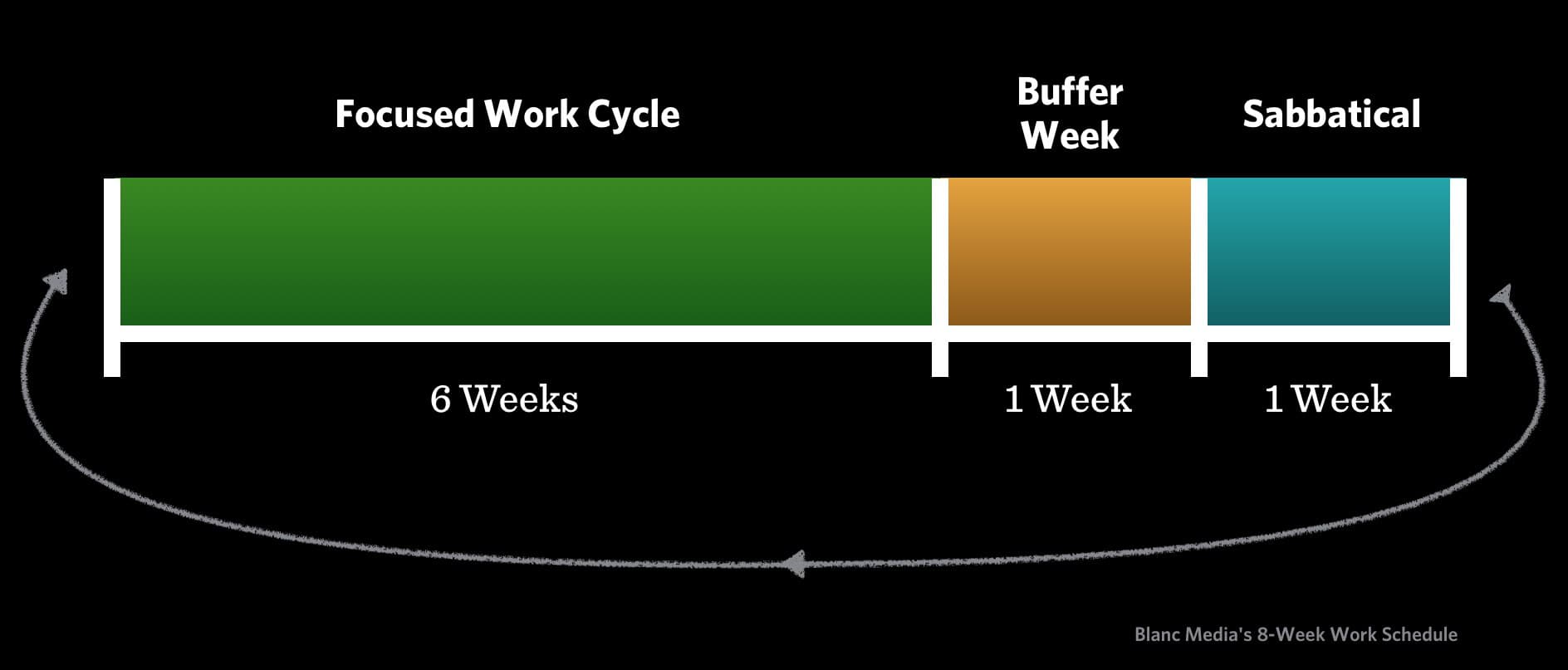At the beginning of 2017, my company started experimenting with an 8-week work cycle.
The cycle looks like this:

(You can read all about the what and why in this detailed article here if you want.)
We are just now wrapping up our first work cycle of 2018. Today — Friday, March 2nd — is the last day of our Sabbatical week, and this coming Monday we will kick off next Focused Work Cycle.
After more than a year of doing this — we’ve done 7 or 8 of them now — I wanted to share a few brief thoughts on the the advantages I’ve found in having a focused, six-week work cycle project followed by time to review and prepare, and then time to rest.
Working in Monk Mode is Awesome
For our 6-week, Focused Work Cycles I usually have just one main project that I am focusing on. Last cycle it was All the Things. And that’s why we were able to go from idea to launched in just 5 weeks.
Having one primary project to focus on allows me to go heads down and work for hours a day without distraction. I call this “Monk Mode”.
When you’re in Monk Mode then all sorts of things become inspiration and ideas for the work. You can keep the whole project in “RAM” in your brain and that makes it much easier to connect ideas.
The result is that projects get done faster and the overall end-result is of a higher caliber.
Not to mention the fact that it means the work is just more fun. Most days I am “finding flow” and seeing regular, tangible progress. The value of this fruit alone cannot be overemphasized.
You Probably Don’t Need as Much Time as You Think You Need
I’ve tried working a 4×10 schedule (where you do 10 hours per day, 4 days a week and then take a 3-day weekend). And while I loved the 3-day weekend, I found that I was less productive overall. Those additional 2 hours per day were usually not very productive for me because I was tired.
I have found that it is much easier to compress 8 weeks worth of work into 6 or 7 weeks than it is to compress 5 days of work into 4 days.
We still work a normal 40-hour work week. But by being focused and intentional with our work (see below), we are simply not wasting time. We are working with intention in order to be done on time.
When I first learned about these types of focused work cycles from Jason Fried, he said that work will take as long as you give it. If you give a project six months then it will take six months; give it six weeks and it will take six weeks.
Resting and Recovering Should Not Be Optional
It used to be that I took time off when I had the time. But I never had the time. There was always more work to be done.
Now, we schedule in our break week to make it mandatory time off. And thus I am actually able to let my mind and emotions recover from the work. Recovery time is critical for sustaining high performance (and even improving performance) without burning out or injuring yourself.
Focus Only on Wildly Important
When you’ve got just 6 weeks to work on something, you are somewhat forced to pick something that will have the highest impact and the lowest effort.
And then, when other ideas come around in the middle of a work cycle, you simply don’t have time to give in to them. And this is liberating. I know of so many places where there is no limit to the amount of active projects a team can have. (I have one good friend who currently is managing 25 active client projects for his company.)
By setting boundaries around what we are currently focusing on and working on, we are able to say no to new ideas while we are currently in the midst of active projects.
As my friend, James Clear, says, highly focused people (and companies) limit their options.
Highly focused people do not leave their options open. They make choices. If you commit to nothing, you’ll be distracted by everything.
The great irony of this is that by limiting your options and remaining focused until you master a skill, you actually expand your options in the long run. Life-changing optionality is a byproduct of providing great value, which can only be achieved through focus.
You can read more about the what and why behind our 8-week work cycles here. And you can also read my notes from the Basecamp workshop I went to where a lot of these ideas came from.